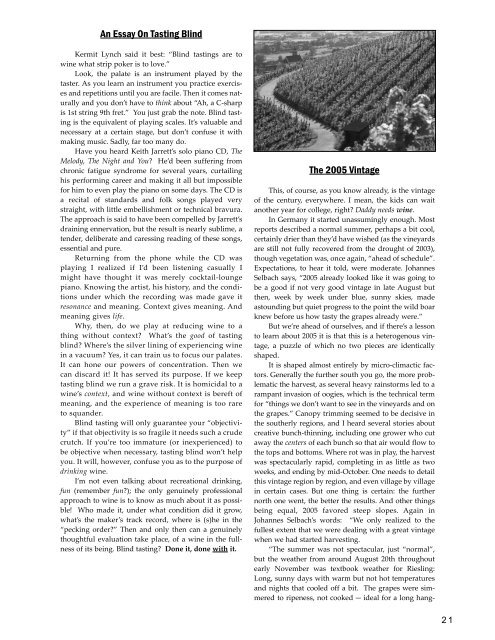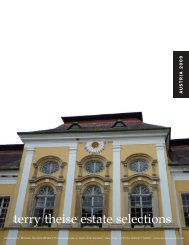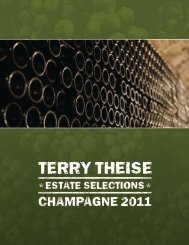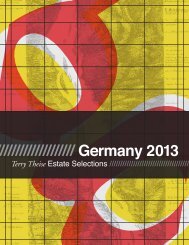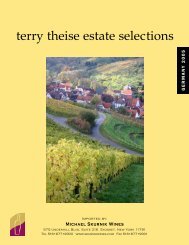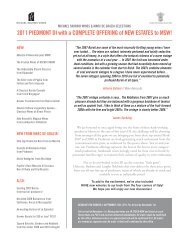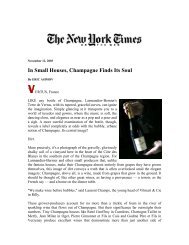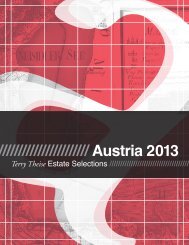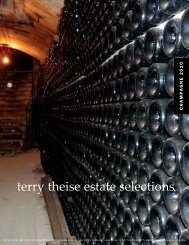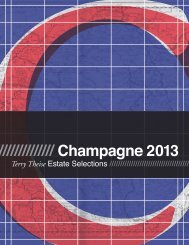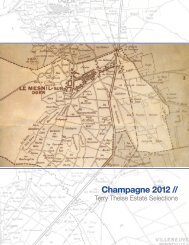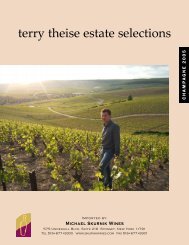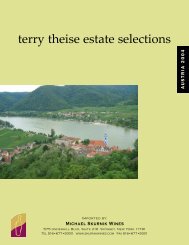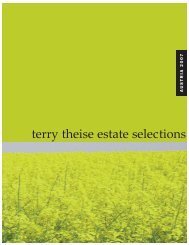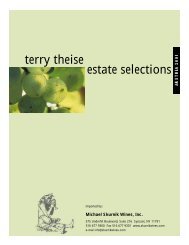German Catalog 2006 USE THIS ONE.qxp - Michael Skurnik Wines
German Catalog 2006 USE THIS ONE.qxp - Michael Skurnik Wines
German Catalog 2006 USE THIS ONE.qxp - Michael Skurnik Wines
You also want an ePaper? Increase the reach of your titles
YUMPU automatically turns print PDFs into web optimized ePapers that Google loves.
An Essay On Tasting Blind<br />
Kermit Lynch said it best: “Blind tastings are to<br />
wine what strip poker is to love.”<br />
Look, the palate is an instrument played by the<br />
taster. As you learn an instrument you practice exercises<br />
and repetitions until you are facile. Then it comes naturally<br />
and you don’t have to think about “Ah, a C-sharp<br />
is 1st string 9th fret.” You just grab the note. Blind tasting<br />
is the equivalent of playing scales. It’s valuable and<br />
necessary at a certain stage, but don’t confuse it with<br />
making music. Sadly, far too many do.<br />
Have you heard Keith Jarrett’s solo piano CD, The<br />
Melody, The Night and You? He’d been suffering from<br />
chronic fatigue syndrome for several years, curtailing<br />
his performing career and making it all but impossible<br />
for him to even play the piano on some days. The CD is<br />
a recital of standards and folk songs played very<br />
straight, with little embellishment or technical bravura.<br />
The approach is said to have been compelled by Jarrett’s<br />
draining ennervation, but the result is nearly sublime, a<br />
tender, deliberate and caressing reading of these songs,<br />
essential and pure.<br />
Returning from the phone while the CD was<br />
playing I realized if I’d been listening casually I<br />
might have thought it was merely cocktail-lounge<br />
piano. Knowing the artist, his history, and the conditions<br />
under which the recording was made gave it<br />
resonance and meaning. Context gives meaning. And<br />
meaning gives life.<br />
Why, then, do we play at reducing wine to a<br />
thing without context? What’s the good of tasting<br />
blind? Where’s the silver lining of experiencing wine<br />
in a vacuum? Yes, it can train us to focus our palates.<br />
It can hone our powers of concentration. Then we<br />
can discard it! It has served its purpose. If we keep<br />
tasting blind we run a grave risk. It is homicidal to a<br />
wine’s context, and wine without context is bereft of<br />
meaning, and the experience of meaning is too rare<br />
to squander.<br />
Blind tasting will only guarantee your “objectivity”<br />
if that objectivity is so fragile it needs such a crude<br />
crutch. If you’re too immature (or inexperienced) to<br />
be objective when necessary, tasting blind won’t help<br />
you. It will, however, confuse you as to the purpose of<br />
drinking wine.<br />
I’m not even talking about recreational drinking,<br />
fun (remember fun?); the only genuinely professional<br />
approach to wine is to know as much about it as possible!<br />
Who made it, under what condition did it grow,<br />
what’s the maker’s track record, where is (s)he in the<br />
“pecking order?” Then and only then can a genuinely<br />
thoughtful evaluation take place, of a wine in the fullness<br />
of its being. Blind tasting? Done it, done with it.<br />
The 2005 Vintage<br />
This, of course, as you know already, is the vintage<br />
of the century, everywhere. I mean, the kids can wait<br />
another year for college, right? Daddy needs wine.<br />
In <strong>German</strong>y it started unassumingly enough. Most<br />
reports described a normal summer, perhaps a bit cool,<br />
certainly drier than they’d have wished (as the vineyards<br />
are still not fully recovered from the drought of 2003),<br />
though vegetation was, once again, “ahead of schedule”.<br />
Expectations, to hear it told, were moderate. Johannes<br />
Selbach says, “2005 already looked like it was going to<br />
be a good if not very good vintage in late August but<br />
then, week by week under blue, sunny skies, made<br />
astounding but quiet progress to the point the wild boar<br />
knew before us how tasty the grapes already were.”<br />
But we’re ahead of ourselves, and if there’s a lesson<br />
to learn about 2005 it is that this is a heterogenous vintage,<br />
a puzzle of which no two pieces are identically<br />
shaped.<br />
It is shaped almost entirely by micro-climactic factors.<br />
Generally the further south you go, the more problematic<br />
the harvest, as several heavy rainstorms led to a<br />
rampant invasion of oogies, which is the technical term<br />
for “things we don’t want to see in the vineyards and on<br />
the grapes.” Canopy trimming seemed to be decisive in<br />
the southerly regions, and I heard several stories about<br />
creative bunch-thinning, including one grower who cut<br />
away the centers of each bunch so that air would flow to<br />
the tops and bottoms. Where rot was in play, the harvest<br />
was spectacularly rapid, completing in as little as two<br />
weeks, and ending by mid-October. One needs to detail<br />
this vintage region by region, and even village by village<br />
in certain cases. But one thing is certain: the further<br />
north one went, the better the results. And other things<br />
being equal, 2005 favored steep slopes. Again in<br />
Johannes Selbach’s words: “We only realized to the<br />
fullest extent that we were dealing with a great vintage<br />
when we had started harvesting.<br />
“The summer was not spectacular, just “normal”,<br />
but the weather from around August 20th throughout<br />
early November was textbook weather for Riesling:<br />
Long, sunny days with warm but not hot temperatures<br />
and nights that cooled off a bit. The grapes were simmered<br />
to ripeness, not cooked — ideal for a long hang-<br />
21


